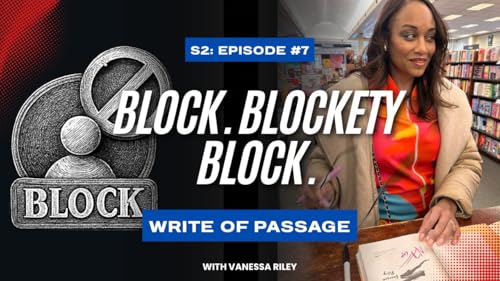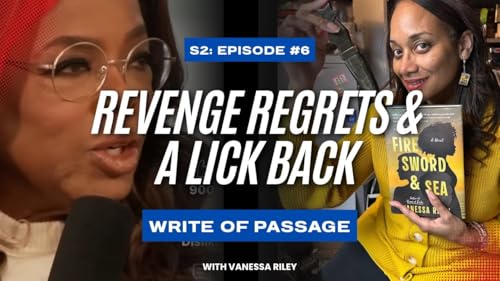By the time you hear this, my twenty-ninth book will no longer be hidden, filtered, or quietly passed around behind publishing gates.It took two and a half years, a global history we were never taught, censorship, delays, stolen copies—yes, pirates—to bring this book into the world.Fire Sword and Sea is about women who refused to disappear, in a time when choosing your own life could get you exiled—or killed.And now, their story is yours.By the time you hear this, my twenty-ninth book will be live—released into the world, no longer hidden behind NetGalley or Edelweis or advanced reader copy structures.It took two and a half years of research, writing, revising, questioning myself, starting over, and fine-tuning every voice until each character could stand on their own feet and speak without apology. Fire Sword and Sea is now available everywhere books are sold—and, I hope, in your libraries. And if it’s not there yet, ask for it. Librarians listen.This book represents not just years of labor, but the weight of them—the questions I’ve been circling, the history I’ve been chasing, the fire I’ve been quietly tending while drumming up attention and conversations, wondering how the world would react when they finally got to see the finished product.And now, you can too.In Fire Sword and Sea, you’ll meet Jacquotte Delahaye—a Black woman of mixed heritage, French and African, who refuses to bend to authority that demands obedience. She wants freedom: the freedom to earn money and spend it as she chooses, the freedom to love whom she wants, not the man her father selects, or the love society deems “appropriate.” Jacquotte resists not because she is reckless, but because she understands that such rigid constructs for women have always been a cage.You’ll meet Bahati, a Black pirate of African descent, who resists every force that tries to dictate how she should labor, whom she should serve, and what she should endure. She chooses piracy not for glory, but for survival—for legacy. She wants a world where her nieces will never know poverty, never know enslavement, never have their lives narrowed by someone else’s greed.You’ll come to know Lizzôa, a spy in Petit-Goâve. If you have ever dreamed against the odds—if you’ve ever needed a guide who knows how to move quietly, how to gather information, how to turn whispers into strategy—Lizzôa is the person who will help you build what you were thought was impossible, what you were even told could never happen. Lizzôa doesn’t follow the orders of men or kings. No Lizzôa bends and reshapes everything with fire. Dreaming is living fire.And you’ll meet Sarah Sayon, a woman willing to do anything to escape a brutal relationship. Her resistance is not gentle. She uses fire to destroy evil and to cleanse the world that tried to break her.There are so many more on the crew in Fire Sword and Sea. You will find yourself and your role.This novel takes you back to a time to the 1600s, when women were given only two roles: wife or wench. Or as a friend said, a heaux or a housewife. This is the original respectability politics, where you fit in or were exiled or killed. Choice was a luxury that women were not meant to have.You may be thinking how can this be? My history books… Le Sigh. This was a time when the world had two true global powers—and they are not who you’ve been taught to expect. The gold belonged to Spain and to the Muslim Mughal Empire. That is why piracy was legal. Every European nation wanted what those empires possessed, and piracy became a sanctioned tool—a way to steal wealth while keeping hands clean and the crimes off your shores.Fire Sword and Sea is a muscular read.It’s a diverse read.It’s a powerful read.These stories and histories have been buried for far too long. With all that’s going one, reading about women who resisted, women who chose, women who refused to disappear quietly, is the book we need.And I’m taking this book on the road.I’ll be heading to Washington, D.C., Petersburg, Virginia, Severna Park, Maryland, St. Louis, Missouri, Austin, Texas, and several stops in Georgia, at Woodstock and Perimeter.Come out and join the tour. I would love to see you. I would love to talk with you about this book.We just kicked things off at the Gwinnett Library—and you readers and podcast listeners, you showed up. Registration sold out. The energy in that room was electric. My moderator, Jasmine Sinkfield, was amazing.And when you work this hard on a book—when you’ve shared many of the battles publicly, as I have—these moments matter.Fire Sword and Sea’s journey hasn’t been easy.There was censorship.Delays in shipping.Publishing slowdowns.Pirates stealing ARCs—yes, really. That happened.And a million other battles that drove me to my knees, again and again, in prayer.But we are here.I’m so excited for you to meet these women. To sit with their choices. To imagine what it meant, ...
Voir plus
Voir moins
 Feb 3 202612 min
Feb 3 202612 min Jan 27 202612 min
Jan 27 202612 min Jan 20 202611 min
Jan 20 202611 min Jan 13 202610 min
Jan 13 202610 min Jan 6 20269 min
Jan 6 20269 min Dec 30 202512 min
Dec 30 202512 min Dec 23 202512 min
Dec 23 202512 min Dec 16 202513 min
Dec 16 202513 min
